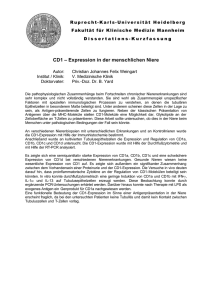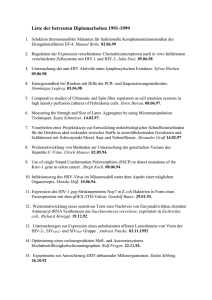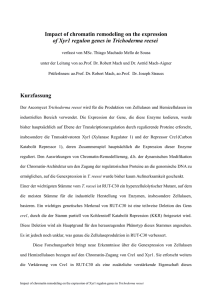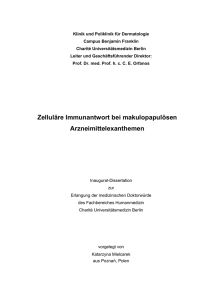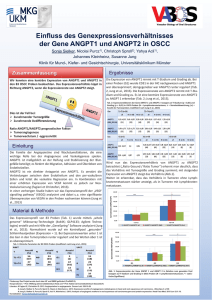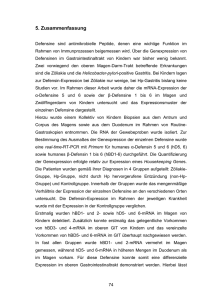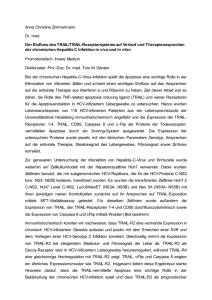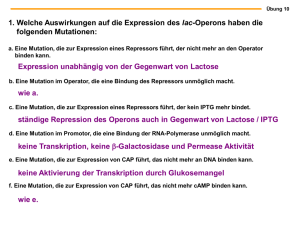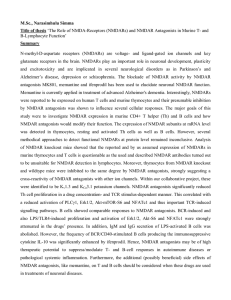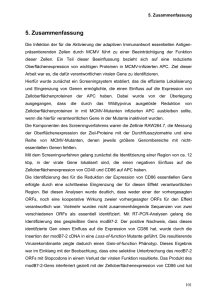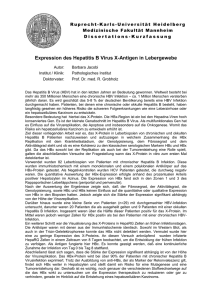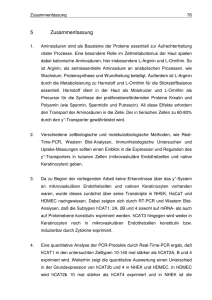V Zusammenfassung 89 V Zusammenfassung Die vorliegende
Werbung
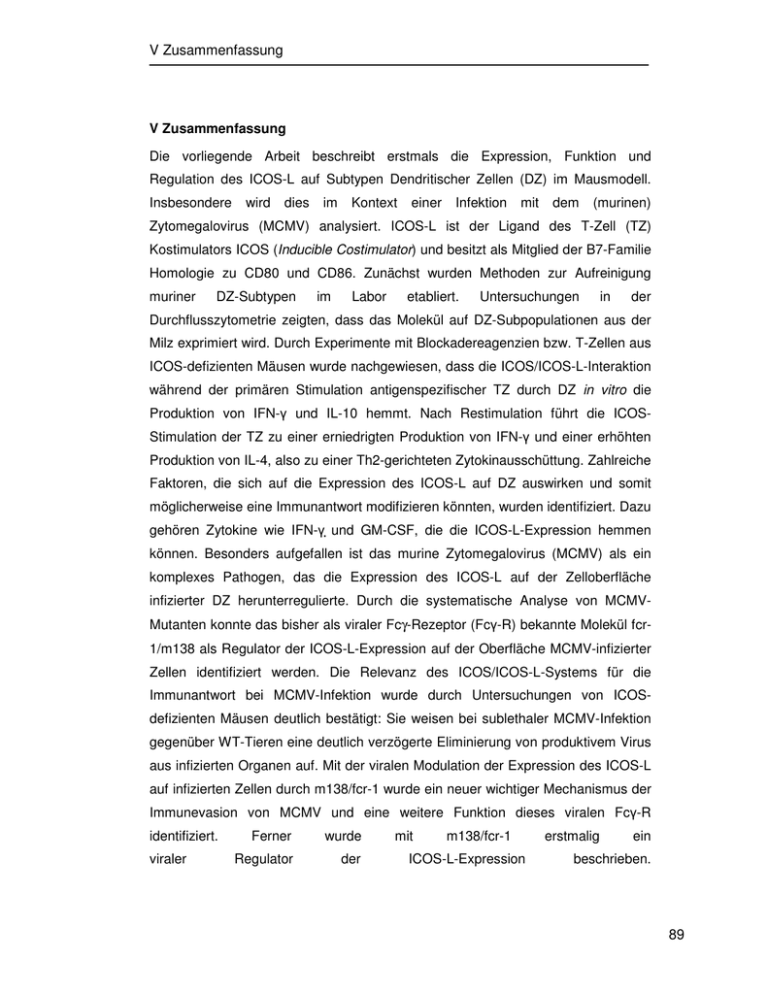
V Zusammenfassung V Zusammenfassung Die vorliegende Arbeit beschreibt erstmals die Expression, Funktion und Regulation des ICOS-L auf Subtypen Dendritischer Zellen (DZ) im Mausmodell. Insbesondere wird dies im Kontext einer Infektion mit dem (murinen) Zytomegalovirus (MCMV) analysiert. ICOS-L ist der Ligand des T-Zell (TZ) Kostimulators ICOS (Inducible Costimulator) und besitzt als Mitglied der B7-Familie Homologie zu CD80 und CD86. Zunächst wurden Methoden zur Aufreinigung muriner DZ-Subtypen im Labor etabliert. Untersuchungen in der Durchflusszytometrie zeigten, dass das Molekül auf DZ-Subpopulationen aus der Milz exprimiert wird. Durch Experimente mit Blockadereagenzien bzw. T-Zellen aus ICOS-defizienten Mäusen wurde nachgewiesen, dass die ICOS/ICOS-L-Interaktion während der primären Stimulation antigenspezifischer TZ durch DZ in vitro die Produktion von IFN-γ und IL-10 hemmt. Nach Restimulation führt die ICOSStimulation der TZ zu einer erniedrigten Produktion von IFN-γ und einer erhöhten Produktion von IL-4, also zu einer Th2-gerichteten Zytokinausschüttung. Zahlreiche Faktoren, die sich auf die Expression des ICOS-L auf DZ auswirken und somit möglicherweise eine Immunantwort modifizieren könnten, wurden identifiziert. Dazu gehören Zytokine wie IFN-γ und GM-CSF, die die ICOS-L-Expression hemmen können. Besonders aufgefallen ist das murine Zytomegalovirus (MCMV) als ein komplexes Pathogen, das die Expression des ICOS-L auf der Zelloberfläche infizierter DZ herunterregulierte. Durch die systematische Analyse von MCMVMutanten konnte das bisher als viraler Fcγ-Rezeptor (Fcγ-R) bekannte Molekül fcr1/m138 als Regulator der ICOS-L-Expression auf der Oberfläche MCMV-infizierter Zellen identifiziert werden. Die Relevanz des ICOS/ICOS-L-Systems für die Immunantwort bei MCMV-Infektion wurde durch Untersuchungen von ICOSdefizienten Mäusen deutlich bestätigt: Sie weisen bei sublethaler MCMV-Infektion gegenüber WT-Tieren eine deutlich verzögerte Eliminierung von produktivem Virus aus infizierten Organen auf. Mit der viralen Modulation der Expression des ICOS-L auf infizierten Zellen durch m138/fcr-1 wurde ein neuer wichtiger Mechanismus der Immunevasion von MCMV und eine weitere Funktion dieses viralen Fcγ-R identifiziert. viraler Ferner wurde Regulator der mit m138/fcr-1 ICOS-L-Expression erstmalig ein beschrieben. 89 V Summary V Summary This work describes for the first time the expression, function and regulation of ICOS-L on subpopulations of murine dendritic cells (DC). This has been analysed particularely in the context of murine cytomegalovirus (MCMV) infection. ICOS-L is the ligand of the T-cell- (TC) costimulatory molecule ICOS (inducible costimulator) and is structurally related to CD80 and CD86. Initially, methods for the purification of murine DC-subpopulations have been succesfully established in the laboratory. Flow cytometry studies revealed that all DC-supopulations from the murine spleen express ICOS-L. Experiments with blocking reagents or TC from ICOS-deficient mice provided evidence that the ICOS/ICOS-L-interaction during primary stimulation of TC by DC inhibits the production of IL-10 and IFN-γ. Furthermore, ICOS-mediated restimulation of the TC led to a reduced production of IFN-γ and an increased production of IL-4, suggesting a Th2-biased cytokine production. Many factors that influence the expression of ICOS-L on DC and that therefore may alter an immune-response have been identified by in vitro experiments. These factors include cytokines like IFN-γ and GM-CSF that can inhibit the expression of ICOS-L. Especially a complex pathogen, MCMV, attracted our attention as a regulator of the expression of ICOS-L on murine DC. In a systematic approach, based on a panel of MCMV gene-deletion mutants we identified fcr-1/m138, a molecule known as a virally encoded Fc-receptor, as a regulator of the ICOS-L- expression on MCMVinfected cells. Studies with ICOS-deficient mice corroborated the important role of the ICOS/ICOS-L-system during the immune-response against an MCMV infection: ICOS-deficient mice show a clearly delayed elimination of productive virus from infected organs compared to wildtype mice. With the modulation of the ICOS-Lexpression on infected cells by fcr-1/m138, a new mechanism for the immuneevasion of MCMV has been identified. Furthermore, our data demonstrate that besides its Fc-binding properties fcr-1/m138 has a new role as a modulator of cell surface proteins. In conclusion, the present work presents the first description of a viral regulator for ICOS-L. 90
